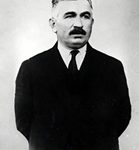 1871 – Sulejman bej Delvina was born, who was a clerk of the Ottoman administration, professor of literature, activist of the Albanian national cause, prime minister and minister of the Albanian state. He completed his higher studies in Istanbul in 1898, at the “Mylkie” high school of administration. He was appointed attaché to the Ottoman MUP in September 1899 and then secretary in the decree office of the Prime Minister, as well as professor of Ottoman literature at the adidadi school in Istanbul in 1901, and held the same position at the Galatasaray High School in 1905. He became the head of the section in the Ministry of Interior and the general director of the vilayets. He was one of the central figures of the Albanian club in Istanbul. Together with other patriots, he opposed the Young Turk policy and the chauvinistic intentions of the neighboring monarchies towards Albania. He took part in the June 1924 Movement and in the government led by Fan Noli was appointed Minister of Foreign Affairs for the period from June 16, 1924 – December 24, 1924. After the failure of this revolution, Delvina left Albania for Italy, a few years after exile he learned that he had a serious illness. Ahmet Zogu paid all the necessary expenses to cure him, in 1928 he returned to Albania, but fell ill again in early 1932. Due to his illness he went to Vlora, where he died on August 1, 1933. He was buried in his hometown where he was also buried his brother a few months ago, Namik.
1871 – Sulejman bej Delvina was born, who was a clerk of the Ottoman administration, professor of literature, activist of the Albanian national cause, prime minister and minister of the Albanian state. He completed his higher studies in Istanbul in 1898, at the “Mylkie” high school of administration. He was appointed attaché to the Ottoman MUP in September 1899 and then secretary in the decree office of the Prime Minister, as well as professor of Ottoman literature at the adidadi school in Istanbul in 1901, and held the same position at the Galatasaray High School in 1905. He became the head of the section in the Ministry of Interior and the general director of the vilayets. He was one of the central figures of the Albanian club in Istanbul. Together with other patriots, he opposed the Young Turk policy and the chauvinistic intentions of the neighboring monarchies towards Albania. He took part in the June 1924 Movement and in the government led by Fan Noli was appointed Minister of Foreign Affairs for the period from June 16, 1924 – December 24, 1924. After the failure of this revolution, Delvina left Albania for Italy, a few years after exile he learned that he had a serious illness. Ahmet Zogu paid all the necessary expenses to cure him, in 1928 he returned to Albania, but fell ill again in early 1932. Due to his illness he went to Vlora, where he died on August 1, 1933. He was buried in his hometown where he was also buried his brother a few months ago, Namik.
 1918 – French pilot and tennis player Roland Garros dies at the age of 29. Garros would serve in the French Air Force’s military squadrons in World War I. He would be considered one of the best pilots, eliminating a number of German aircraft. He would be taken prisoner and practiced the sport of tennis in the camp where he was imprisoned. He would then flee, thus rejoining the ranks of the air force where he would find death during a fight. One of the most important tennis tournaments in the world is played in his honor.
1918 – French pilot and tennis player Roland Garros dies at the age of 29. Garros would serve in the French Air Force’s military squadrons in World War I. He would be considered one of the best pilots, eliminating a number of German aircraft. He would be taken prisoner and practiced the sport of tennis in the camp where he was imprisoned. He would then flee, thus rejoining the ranks of the air force where he would find death during a fight. One of the most important tennis tournaments in the world is played in his honor.
 1945 – One of the most powerful demonstrations to hit the world’s leading film industry explodes in Hollywood, Los Angeles. Thousands of workers from various unions would physically clash with the police over their rights. For 6 months in a row, strong strikes and demonstrations would seize the premises of the famous Warner Bros. film studio. Dozens would be injured on both sides. But then everything would calm down after the conditions were met by the companies.
1945 – One of the most powerful demonstrations to hit the world’s leading film industry explodes in Hollywood, Los Angeles. Thousands of workers from various unions would physically clash with the police over their rights. For 6 months in a row, strong strikes and demonstrations would seize the premises of the famous Warner Bros. film studio. Dozens would be injured on both sides. But then everything would calm down after the conditions were met by the companies.
 1948 – One of the most devastating earthquakes in the history of this country falls in the capital of Turkmenistan, Ashgabat (then part of the USSR). With a magnitude of 7.3 on the Mercalli scale, it would destroy thousands of buildings. Damage to people would be estimated at about 110 thousand dead, and 200 thousand injured. The homeless would exceed half a million. This earthquake would be felt in the neighboring countries of Central Asia.
1948 – One of the most devastating earthquakes in the history of this country falls in the capital of Turkmenistan, Ashgabat (then part of the USSR). With a magnitude of 7.3 on the Mercalli scale, it would destroy thousands of buildings. Damage to people would be estimated at about 110 thousand dead, and 200 thousand injured. The homeless would exceed half a million. This earthquake would be felt in the neighboring countries of Central Asia.
 1970 – One of the largest American television channels is established in Los Angeles. Public Broadcasting Service, otherwise known as PBS, it would soon revolutionize the American media world. Some of the most watched series on this channel are, Sesame Street, Antiques Roadshow, Masterpiece, and Big Red Dog. This television platform today has over 350 other channels that are broadcast under its logo. Along with CBS, ABC, and CNN this will rank among the U.S. television media elite.
1970 – One of the largest American television channels is established in Los Angeles. Public Broadcasting Service, otherwise known as PBS, it would soon revolutionize the American media world. Some of the most watched series on this channel are, Sesame Street, Antiques Roadshow, Masterpiece, and Big Red Dog. This television platform today has over 350 other channels that are broadcast under its logo. Along with CBS, ABC, and CNN this will rank among the U.S. television media elite.
 1975 – World-famous actress Kate Winslet is born in Berkshire, England. Winslet during her 15-year career would star in many films where she would leave a mark on her roles. Among the most prominent are Hamlet, Titanic, Enigma, Carnage, and Collateral Beauty. Winslet, would win a number of important national and international awards such as Academy Award, Golden Globe, BAFTA, Empire Awards, etc.
1975 – World-famous actress Kate Winslet is born in Berkshire, England. Winslet during her 15-year career would star in many films where she would leave a mark on her roles. Among the most prominent are Hamlet, Titanic, Enigma, Carnage, and Collateral Beauty. Winslet, would win a number of important national and international awards such as Academy Award, Golden Globe, BAFTA, Empire Awards, etc.
 1984 – Marc Ganeau becomes the first Canadian astronaut to go into space. Ganeau would later serve, also as an engineer and Minister of Transport. He would travel into space three times on several missions which consisted of repairing several satellites and airspace spacecraft. For these merits, he would be decorated with the highest medals and orders of honor by the Canadian government.
1984 – Marc Ganeau becomes the first Canadian astronaut to go into space. Ganeau would later serve, also as an engineer and Minister of Transport. He would travel into space three times on several missions which consisted of repairing several satellites and airspace spacecraft. For these merits, he would be decorated with the highest medals and orders of honor by the Canadian government.
 1986 – Israeli nuclear scientist Mordechai Vanunu tells his story in the prestigious British newspaper The Sunday Times. During this confession, the government of Israel was forced to accept before the eyes of the world the development of its nuclear program. Also known as the Vanunu Scandal, this evidence would expose all the military secrets of the nuclear program by official Jerusalem. During this period the circulation of this gazette increased significantly.
1986 – Israeli nuclear scientist Mordechai Vanunu tells his story in the prestigious British newspaper The Sunday Times. During this confession, the government of Israel was forced to accept before the eyes of the world the development of its nuclear program. Also known as the Vanunu Scandal, this evidence would expose all the military secrets of the nuclear program by official Jerusalem. During this period the circulation of this gazette increased significantly.
 2000 – Powerful demonstrations and civil disobedience to dictator Slobodan Milosevic erupt in Serbia. After the end of the Kosovo war, a year later, Serbia’s economy had reached a critical point, causing much dissatisfaction among the people. Also known as the Bulldozer Revolution, it would cause the fall of Milosevic’s government, and his arrest a few months later. But although this revolution would overthrow his government, the overall Serb approach to Kosovo would not change.
2000 – Powerful demonstrations and civil disobedience to dictator Slobodan Milosevic erupt in Serbia. After the end of the Kosovo war, a year later, Serbia’s economy had reached a critical point, causing much dissatisfaction among the people. Also known as the Bulldozer Revolution, it would cause the fall of Milosevic’s government, and his arrest a few months later. But although this revolution would overthrow his government, the overall Serb approach to Kosovo would not change.






